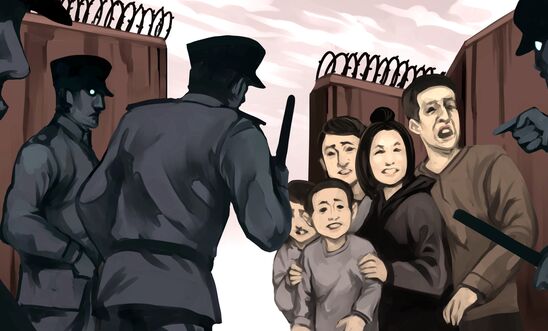
Press releases
China: Uyghur children sent to 'orphan camps' in Xinjiang

Uyghurs in exile in Italy, Turkey and elsewhere discover their children in China have been sent to ‘orphan camps’
Other relatives in Xinjiang targeted and unable to look after the children
Orphan camps part of wider crackdown on Uyghurs
"Now my children are in the hands of the Chinese government and I am not sure I will be able to meet them again in my lifetime" - Uyghur parent in Italy
The exiled families of Uyghur children held in ‘orphan camps’ in the Chinese region of Xinjiang have described their torment in new research published by Amnesty International today.
Amnesty spoke to parents who have been completely cut off from their children - some as young as five years old - and cannot return to China due to the threat of being sent to a “re-education” internment camp themselves.
In the 16-page account of their experiences, Amnesty interviews exiled Uyghur families currently living in Australia, Canada, Italy, the Netherlands and Turkey. The families, all of whom left China prior to the intensification of the crackdown on Uyghurs and other Muslim minority groups in 2017, had not anticipated that their children would be prevented from joining them.
Parents Mihriban Kader and Ablikim Memtinin fled from Xinjiang to Italy in 2016 after being harassed by police and pressured to give up their passports. They left four children in the temporary care of grandparents, but soon afterwards the grandmother was taken to a camp, while the grandfather was interrogated by police.
The three youngest children were sent to an ‘orphan camp’ - facilities set up across Xinjiang to hold and indoctrinate children whose parents have been forced into internment camps, prison or other detention facilities. The eldest child was placed in a boarding school subjected to tight surveillance. Mihriban and Ablikim were unable to contact their children from Italy, but in 2019 they received a permit from the Italian authorities to bring them to Italy. The four children - aged between 12 and 16 - travelled alone across China to the Italian consulate in Shanghai, but were seized by police and sent back to the orphanage and boarding school.
Mihriban Kader told Amnesty:
“Our other relatives didn’t dare to look after my children after what had happened to my parents. They were afraid that they would be sent to camps too.
“Now my children are in the hands of the Chinese government and I am not sure I will be able to meet them again in my lifetime. The thing that hurts most is that, to my children, it’s as if their parents don’t exist anymore; as if we passed away and they are orphaned.”
In another case, Omer and Meryem Faruh fled to Turkey in late 2016 after police demanded they hand over their passports. They left their two youngest children, aged five and six, with grandparents because they did not yet have their own travel documents. Omer and Meryem later found out their relatives had been taken to camps, and they have received no word about their children since.
Omer Faruh told Amnesty:
“We haven’t heard the voices of our daughters for the last 1,594 days. My wife and I cry only at night, trying to hide our sorrow from our other kids here with us.”
Amnesty is calling on the Chinese government to provide unrestricted access to Xinjiang for UN human rights experts, independent researchers and journalists to allow them to conduct investigations in the region. Amnesty is also urging other governments to ensure that Uyghurs, Kazakhs and other ethnic minorities from China resident in their countries are provided with assistance in trying to locate, contact and reunite with their children.
Since 2017, it is estimated that at least one million people - predominantly Muslim Uyghurs - have been arbitrarily detained in so-called “transformation-through-education” or “vocational training” centres in Xinjiang, where they have been subjected to various forms of torture and ill-treatment, as well as political indoctrination and forced cultural assimilation.
Alkan Akad, Amnesty International’s China Researcher, said:
“The heartbreaking testimonies of the parents we spoke to only scratches the surface of the scale of suffering endured by Uyghur families separated from their children.
“China’s ruthless mass detention campaign in Xinjiang has put separated families in an impossible situation: children are not allowed to leave, but their parents face persecution and arbitrary detention if they attempt to return home to care for them.
“Uyghurs overseas often hesitate to publicly talk about human rights abuses against them and their families due to fear of repercussions for their relatives back in China. In spite of such challenges, these parents have decided to publicly share their stories in the hope that it will help them reunite with their children.
“The tragedy of family separation in Xinjiang exposes the inhumanity of China’s efforts to control and indoctrinate Uyghurs and other Muslim ethnic groups in the name of ‘countering terrorism’.
“China must end the measures that restrict the rights of all Muslim minorities to freely leave and return to the country. It must close all political ‘re-education camps’ and release detainees immediately, unconditionally and without prejudice.”